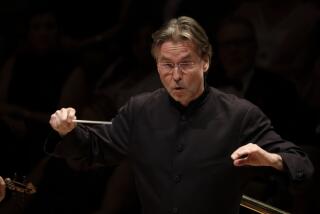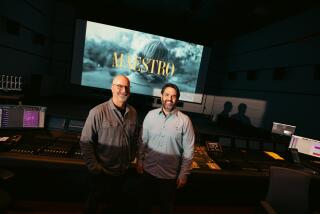Tovey conducts Chang and the Philharmonic
That irrepressible British wit Bramwell Tovey -- who also happens to be principal guest conductor of the Los Angeles Philharmonic at the Hollywood Bowl -- was at it again Tuesday night. And this time, he could thank our politicians, spinmeisters and news media for some fresh comic ideas.
While musing about the misadventures of the “dreadful” Peer Gynt, Tovey couldn’t help but crack, “Even though he was from a land of the North, he wasn’t vice presidential material!” -- adding, for political balance, “Or the governor of New York!” Earlier, explaining the plot of Carl Nielsen’s opera “Maskarade,” Tovey pointed out that the characters “have properly vetted each other.”
Who could blame him? This stuff writes itself. In any case, “The Daily Show With Bramwell Tovey” provided the finishing touches to an all-Scandinavian program that Tovey fashioned around the appearance of violinist Sarah Chang in the Sibelius Violin Concerto. He helped himself to some of the best-known pieces by the big-name composers from Denmark (Nielsen), Norway (Grieg) and Finland (Sibelius), leaving only poor Sweden out in the cold, as it were.
Perhaps Nielsen isn’t as much a part of the mainstream as Sibelius and Grieg, but his Overture to “Maskarade” is a terrific way to sample his idiom in less than five minutes. The composer’s symphonic language -- including the obsessively repeated motifs and the harmonic tang -- is all there in microcosm, and Tovey gave the piece a graceful, flippant ride.
The conductor also refused to take Grieg’s “Peer Gynt” Suite No. 1 for granted, setting comfortable tempos, getting a smooth, strong string sound in “Aase’s Death” and characterful phrasing elsewhere. Sibelius’s “Finlandia” had plenty of snap, drive and weight, the Philharmonic still running on the head of steam built up during its Sibelius Festival last fall.
Though written in 1903-05, the Sibelius concerto did not become one of the most-played violin concertos until about 40 years ago -- and at that point that tempos started getting slower and slower. This performance thankfully bucked that trend, for Chang and Tovey brought it in at under half an hour, which hardly any modern recordings -- even Chang’s own from a decade ago -- do.
Otherwise, Chang was in erratic form, digging in so aggressively at times that portions of the first and third movements were littered with tattered passages, although she had the architecture of the slow movement well in hand. Tovey got the pacing and the rolling climaxes right, but the dark, brooding tone in the first movement was muted, as was the thrumming rhythm of the finale. You always hope for an ideal combination of what one critic called “fire and ice” (ironically, the title of one of Chang’s albums) in this concerto, but the performance fell short of that.
More to Read
The biggest entertainment stories
Get our big stories about Hollywood, film, television, music, arts, culture and more right in your inbox as soon as they publish.
You may occasionally receive promotional content from the Los Angeles Times.






